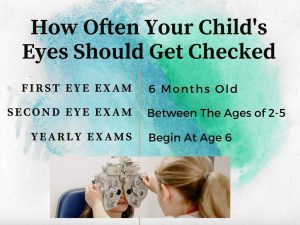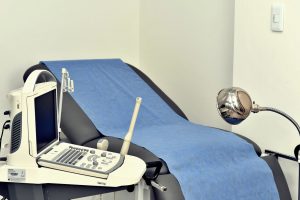August is Children’s Eye Health and Safety Awareness Month, so let’s all take a moment and think about when we last took our children to the optometrist to get their eyes checked. If you’re like a lot of parents, you might not have taken them in a long time, or even ever, if they’ve never shown any obvious signs of vision impairment. Getting regular eye exams, though, is not something we should put off; after all, according to the CDC, approximately 6.8% of children younger than 18 in the United States have a diagnosed eye or vision condition, with studies suggesting that 10% of preschoolers and 25% of school-aged children have vision issues. This month, we want to help raise awareness about the importance of eye care for your children, and how keeping on top of their eye health can help your child succeed.
How Often Your Child Should Get Checked
Your child should see an optometrist for their first eye exam when they are around 6 months old. The doctor will check their eye movement patterns, as well as check for any eye health issues that could need correction, like astigmatism, farsightedness, and nearsightedness. After this initial eye exam, your child should be seen again at least once between the ages of 2 and 5; this is important because, according to the American Optometric Association, 1 in 4 children wear or need glasses by the time they are in kindergarten! Once your child is 6 years old, you should take them to the optometrist every year for vision screenings (your pediatrician might do these at their annual well visits, as well).
Why It Is Important To Get Regularly Checked
As children grow, their eyes change quickly, so the best way to catch any problems early on is by getting their eyes checked regularly. Not only that, but making sure your child’s eyes are healthy is vital to their education: according to the American Optometric Association, about 80% of learning in school occurs through visual activities like reading, writing, and using computers, so if your child has undiagnosed eye issues, they can end up having difficulty keeping up in school. They can become easily fatigued and have problems with attention because they are struggling; in addition, if they play sports, their vision could cause hand-eye coordination problems, and they could get injured.
While your pediatrician and your child’s school do perform annual vision screenings, these screenings will only test whether your child’s vision is 20/20, or if they have issues seeing things that are close up or far away. These simple screenings cannot recognize or point out any specific eye conditions your child may be experiencing – in fact, around 60% of vision problems go undetected with one of these screenings.
Early Signs Of Eye Conditions

Children might not realize that they have vision issues, or might be having issues but won’t complain to you about them, so it’s important for you to be aware of the common signs and symptoms of eye conditions, and seek help if necessary. Common signs of vision issues in children can include:
- Squinting
- Frequently rubbing their eyes
- Straining or turning their head to look at things
- Lazy eye
- Color blindness
- Blurry or distorted vision, which is a sign of astigmatism
- Frequent headaches
- Covering one eye
- Holding things close to their face
- Short attention span
- Difficulty with hand-eye coordination while playing sports
Ways You Can Protect Your Children’s Eye Health
There are some proactive things you can do to improve your child’s eye health, including:
- Look for the common signs of eye issues above.
- Provide a balanced diet- nutrients such as zinc, omega-3 fatty acids, and vitamins A, C, and E are all beneficial to eye health.
- Protect their eyes with necessary eyewear- if your child is active and plays sports, make sure to provide them with protective eyewear made with shatterproof plastic. Research shows that 90% of childhood eye injuries can be prevented!

- Limit use of digital screens– try to keep screens 18-24 inches from their eyes and encourage them to follow the 20-20-20 rule, which means they should try to look up from the screen every 20 minutes and look at something at least 20 feet away for 20 seconds.
- Attend regular eye exams!
Getting regular, thorough eye exams and treating any vision conditions is important for your child’s health, as well as for their academic success. Taking your child to the optometrist can help catch any conditions that your child’s pediatrician or school nurse cannot, but some health insurance plans do not cover vision care – so if you are interested in a more comprehensive health insurance plan that does offer great vision care, EZ can help! Our agents work with the top-rated insurance companies in the country, and we can compare all available plans and find the best, most affordable plan for your family’s needs. To get free instant quotes, simply enter your zip code in the bar above, or to speak to a licensed agent, call 888-350-1890. No obligation!















